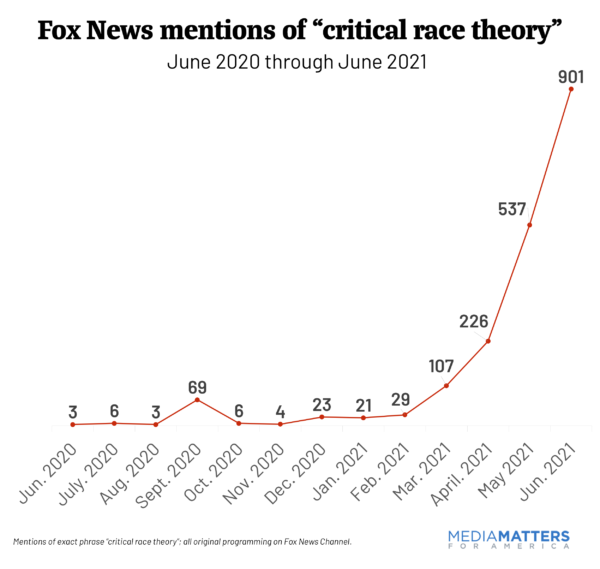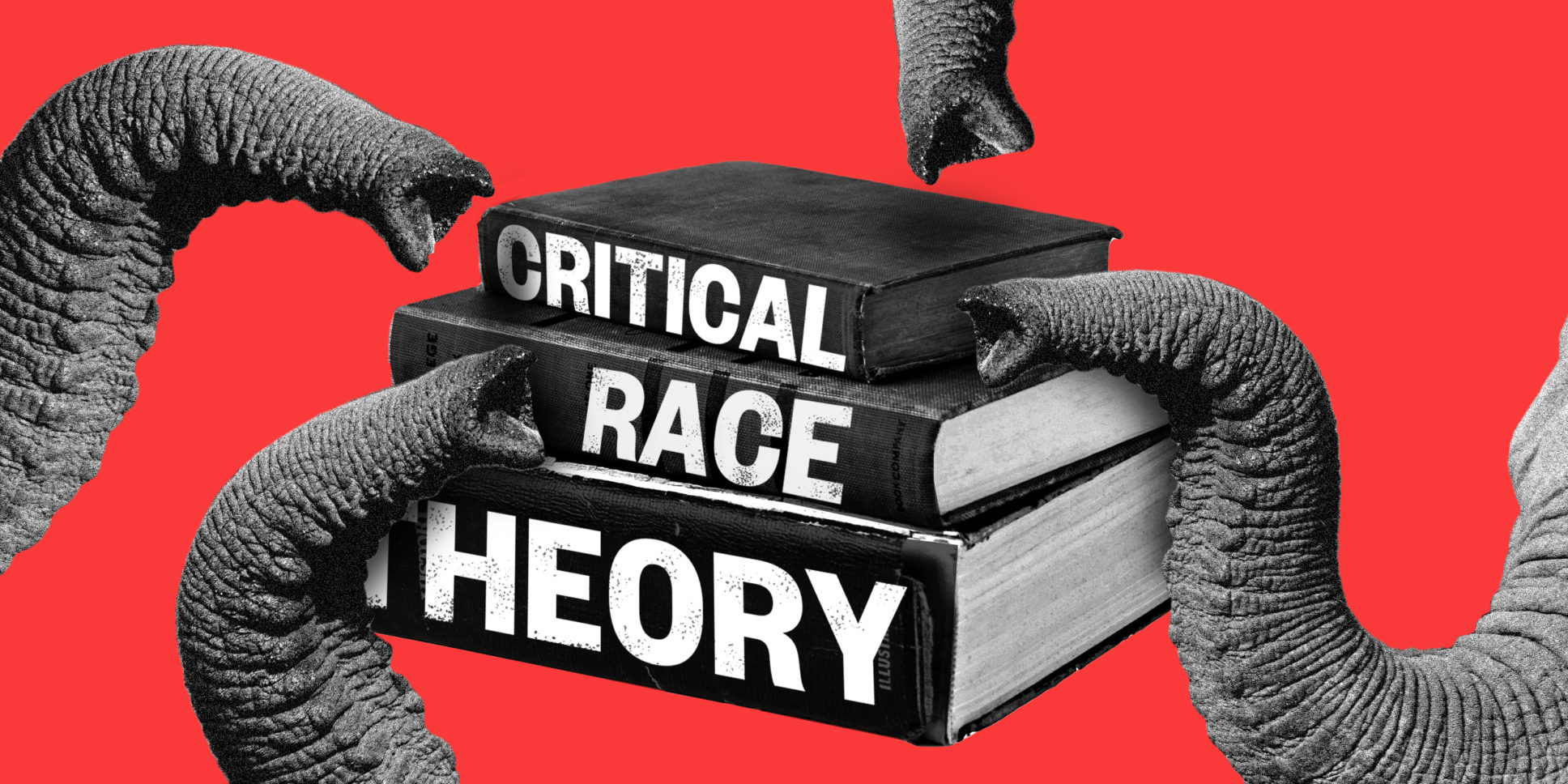Right-wing panic over “critical race theory” has come to a head in news media and politics over the past few months, as conservative organizations use the once-obscure term to generate outrage and score political victories.
Critical race theory is a decades-old academic framework that examines the impact of systemic racism on American society. It contends that race is a social construct, and that racism is not merely the product of individual bias or prejudice, but also something embedded in legal systems and policies. In summer 2020, Fox News began a campaign falsely painting CRT as “racist,” “Marxist,” and punishing to white people. Since then—and coinciding with one of the most significant civil rights protests in decades—the network has been fearmongering about CRT, resulting in right-wing panic, a Trump executive order, and Republican bills attempting to ban its teaching.
Fox launched its anti-CRT propaganda campaign a year ago, but mentions of “critical race theory” have skyrocketed in recent months. In June there were 901 mentions, up from 537 in May, and over 1,900 in the past 3 ½ months. Throughout this escalating campaign, Fox has brought on guests purported to be concerned parents or educators who oppose the teaching of “critical race theory.” Nearly a dozen of them are Republican strategists, conservative think-tankers, or right-wing media personalities, though the network has downplayed or ignored these ties.

A Media Matters graph charts mentions of “critical race theory” on Fox News
As Media Matters describes, a feedback loop between right-wing institutions is fueling the GOP’s anti- CRT strategy. Like “cancel culture” and “political correctness” before it, “critical race theory” operates “as an umbrella term the right-wing movement uses to turn its mostly white adherents’ racial anxiety into political energy.”
The feedback loop begins with conservative think tanks. These organizations engineered a method to discuss “critical race theory” that aims to “put all of the various cultural insanities under that brand category” so media consumers “read something crazy” and think of CRT. Conservative advocacy groups use this framework to gather attention to their flawed understanding of the concept, stirring controversy and creating further demand for the think tanks’ work. The advocacy then generates right-wing press coverage on culture war outrages, which incentivizes GOP politicians to take action to win votes.
An investigation by Popular Information revealed that many of the organizations behind the CRT panic receive funding from the Thomas W. Smith Foundation. The founder keeps a low profile, but the group’s most prolific worker, James Piereson, has clearly positioned himself against racial and economic equality. As the report explains, his stance illustrates a key point in the right-wing strategy: “It’s hard to generate excitement around tired arguments opposing diversity and racial equality. It’s easier to advocate against CRT, a term that sounds scary, but no one really understands.” The foundation has donated more than $12.7 million to 21 organizations attacking CRT, including The Manhattan Institute, a conservative think tank where Piereson is a senior fellow.
Teachers across the country have felt the effects of indignation over the teaching of American history. Rodney D. Pierce, a Black teacher in North Carolina, “started to feel like a target” when parents began contacting his school to complain about their students’ “gloomy” social studies curriculum. Timothy Mudd, the school’s principal, noted that all the complaints were from white parents, and none of them concerned white teachers.
Pierce isn’t alone in his frustration, as Republicans in more than two dozen states have introduced legislation to restrict how teachers discuss “divisive” topics, such as racism, sexism, justice, and equality. An Education Week review details what is banned under “critical race theory” laws passed in 10 states: teachers discussing racism and sexism in violation of a new Arizona state law can have their certification revoked, whereas Tennessee will take money away from the teacher’s school district. New Hampshire parents will be allowed to sue the school district if teachers examine these topics.
As legislators pass restrictive bills and the culture war grows bitterer, media must be diligent when attempting to measure public opinion on CRT. Recent polls by Politico, The Economist, and YouGov failed to measure participants’ understanding of critical race theory, leading to misleading numbers that right-wing media reported.
Further, as FAIR notes, “This isn’t an issue that can be both-sidesed or depoliticized”—while the Fox-fueled outrage machine tramples truth and distorts history, the rest of mainstream news must confront the hysteria as a flagrant attempt to silence dissent against white supremacy.
Image via MSNBC

